Search
Did you mean: Ull?
Remove Ads
Advertisement
Summary 
Loading AI-generated summary based on World History Encyclopedia articles ...
Search Results
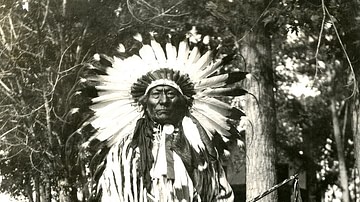
Definition
White Bull
White Bull (Tatanka Ska, l. 1849-1947) was a Hunkpapa Lakota Sioux warrior, nephew of Sitting Bull (l. c. 1837-1890), who is among the many claimed to have killed Lt. Colonel George Armstrong Custer (l. 1839-1876) at the Battle of the Little...
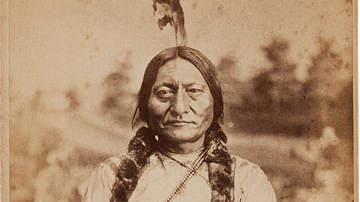
Definition
Sitting Bull
Sitting Bull (Tatanka Iyotanka, l. c. 1837-1890) was a Hunkpapa Sioux holy man, warrior, leader, and symbol of traditional Sioux values and resistance to the United States' expansionist policies. He is among the best-known Native American...
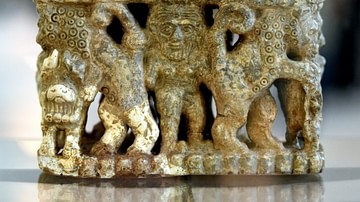
Article
Gilgamesh and the Bull of Heaven
Gilgamesh and the Bull of Heaven is a Sumerian poem relating the event, now famous from The Epic of Gilgamesh, in which the goddess Inanna/Ishtar sends the celestial bull to attack Gilgamesh after he has rejected her advances. The epic changes...
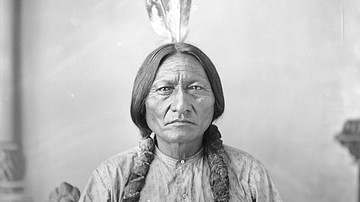
Article
Charles A. Eastman on Sitting Bull
In his Indian Heroes and Great Chieftains (1916), Sioux author and physician Charles A. Eastman (also known as Ohiyesa, l. 1858-1939), includes a brief biography of the Sioux chief Sitting Bull (l. c. 1837-1890). While some of Eastman's claims...
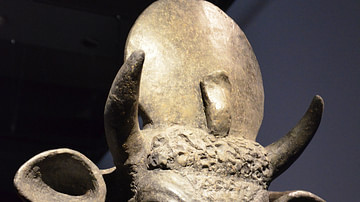
Definition
Apis
Apis was the most important and highly regarded bull deity of ancient Egypt. His original name in Egyptian was Api, Hapi, or Hep; Apis is the Greek name. He is not, however, associated with the god Hapi/Hep who was linked to the inundation...
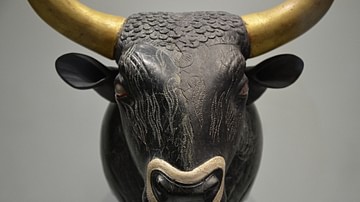
Image
Bull’s Head Rhyton from Knossos
Bull’s head rhyton from the palace at Knossos in Crete. The carving, from a single block of black steatite, is remarkable for it was worked with great precision to render the natural features of the real animal. The eyes are inlaid with rock...
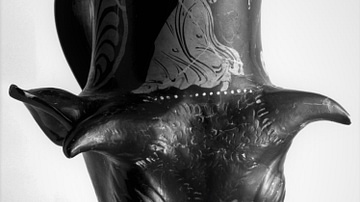
Image
Bull Head Rhyton with Dancer & Tympanon
Apulian red-figure drinking-vessel from c. 360 BCE, attributed to the Illupersis Painter of South Italy (active c. 375-350 BCE), The J. Paul Getty Collection, Malibu, no. 71.AE.196 Horn-shape drinking vessels are among the earliest finer...
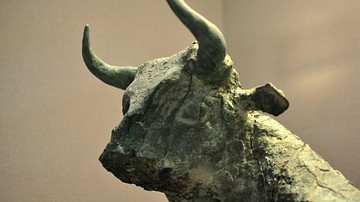
Image
Bull's head from the Temple of Ninhursag
This head is part of a copper alloy bull in the round. This is the best preserved bull of four similar bulls found and it is the only one which kept its head. Early Dynastic Period, circa 2500 BCE. From the Temple of Ninhursag at Tell Al-Ubaid...
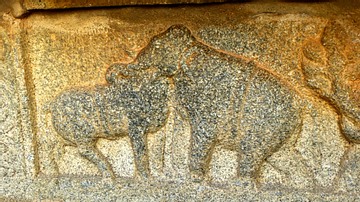
Image
Bull and Elephant Composite, Vittala Temple, Hampi
Composite bull and elephant stone sculpture at Vittala Temple, Hampi, India. Carved between 1300 - 1500 CE, this sculpture has a bull on the left and an elephant on the right with a single representation of the head.

Image
Bull Inlay from Sumer
An alabaster inlay of a bull. Early dynastic period, 2750-2300 BCE. From Sumer, southern Mesopotamia, Iraq. (The Burrell Collection, Glasgow, Scotland).